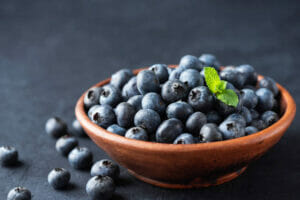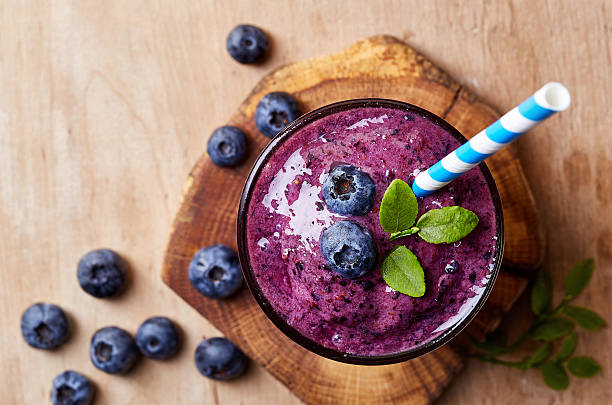What do you know about blueberries? How often do you take them? Why should you consume them? In this article, we’ll cover what blueberries are and the health benefits of blueberry juice.
Have you heard of the term ‘small but mighty?’ This is a term that you can unmistakably associate with blueberries. Blueberries are one of the tiniest fruits you’ll ever see, but inside that tininess, is a bucket full of nutrients. Before I begin to tell you how awesome this fruit is, let’s talk about a bit of science.
Blueberries are a widely distributed and widespread group of perennial flowering plants with blue or purple berries. They are classified in the section Cyanococcus under the genus Vaccinium.
These berries are some of the healthiest berries available and are often considered a superfood for their high antioxidant content. There are so many health benefits of blueberry juice.

NUTRITIONAL COMPOSITION OF BLUEBERRY
One serving of raw blueberries is one cup (148g), which provides 84 calories, 1g of protein, 21g of carbohydrates, and 0.5g of fat. Blueberries are an excellent source of vitamin C, vitamin K, and manganese.
Blueberries contain a plant compound called anthocyanin. This important compound gives blueberries both their blue colour and many of their health benefits. Blueberries can help and promote a healthy heart, bone strength, skin health, blood pressure, in the management of diabetes, prevention of cancer and mental health.
Fun fact: One cup of blueberries provides 24 per cent of a person’s recommended daily allowance of vitamin C.
Many studies have suggested that increasing the consumption of plant foods such as blueberries decreases the risk of obesity, diabetes, heart disease, and overall mortality. Plant foods may also promote hair and skin health, increased energy, and overall lower weight.
Enough about blueberries, let’s jump into the main subject of this article, which is blueberry juice and what are the health benefits of blueberry juice?
What is blueberry juice?
This is really simple. It is the juice extracted from the blueberry fruit. In order words, defined in more scientific terms, blueberry juice is made by blending or pressing blueberries, into a nutrient-dense beverage.
The health benefits of blueberries are also imparted in the juice, but herein, we will be talking in detail about this refreshing and oh-so-healthy fruit drink.
Would you like to learn how to make blueberry juice? Read on to find out!
Blueberry juice may be made from blueberries or from blueberry concentrate. Many brands of blueberry juice also add other fruit juices such as pomegranate, blackberry, apple, or cherry. Blueberry juice may also be combined with lemonade. You may wonder if drinking the juice of blueberry is the same as eating the fruit. The simple answer to this is that in general, eating whole fruit is considered to be healthier than drinking fruit juice. However, to gain some of the health benefits of blueberry juice, drink 100% blueberry juice.
NUTRITIONAL COMPOSITION OF BLUEBERRY JUICE
One 8-ounce serving of blueberry juice provides the following nutrients:
Calories: 92
Fat: 0.5g
Sodium: 5mg
Carbohydrates: 23.4g
Fibre: 4g
Sugars: 16g
Protein: 1.2g
Vitamin C: 15.6mg
Vitamin K: 31mcg
In terms of nutrition, blueberry juice offers extremely high levels of vitamin C as well as good amounts of dietary fibre, vitamin A, potassium and vitamin K This juice also contains high levels of tannins, anthocyanins, salicylates, and various other antioxidants that are very vital and important for your overall health and wellbeing.
Before we talk about the health benefits of blueberry juice. Let us examine in detail, the nutrient profile of blueberry juice. This is because the nutrient it contains, determine the health benefits of blueberry juice.
Let us begin!
Vitamin C
As stated earlier, blueberry juice contains high amounts of vitamin C. This is one vitamin that is very essential for overall health. Vitamin C aids in the production and repair of body tissues, and it also helps to make collagen. Collagen is a protein that is essential for healthy skin, cartilage, tendon, ligaments and blood vessels. Vitamin C also helps maintain healthy bones and teeth and assists with wound healing.
Antioxidants
Think of antioxidants as one of the trademarks of this drink and is responsible for most of the health benefits of blueberry juice. Blueberries and pure blueberry juice are sometimes referred to as antioxidant foods. This is because of their high levels of polyphenols and in particular, anthocyanins, the phytochemical that gives blueberries their colour.
The high levels of vitamins A, C and E also contribute to blueberry juice’s reputation as an antioxidant, as these vitamins are commonly referred to as antioxidant vitamins. Antioxidants are substances that help to protect your cells from the effects of free radicals.
Free radicals, also called reactive oxygen species, are produced when your body breaks down certain foods or exposure to environmental toxins, such as radiation or tobacco smoke. Free radicals can damage cells, leading to faster ageing and may increase the risk of heart disease and cancer. In summary, blueberries can help to protect your body from these reactive oxygen species.
Fibre
Pay extra attention here. One of the reasons why you are encouraged to eat whole fruits instead of juice is because whole fruits are richer in fibre than fruit juices. Blueberry juice is usually served or sold without any of the pulp from the fruit. This means that blueberry juice, unlike raw blueberries, contains very little dietary fibre, which is a significant part of the health benefit of whole blueberries.
Dietary fibre is made up of the part of the plant that your body is unable to digest. Fibre adds bulk, making you feel fuller faster, and can help control your body weight. In addition, it can help your overall digestion and prevent constipation. If you are juicing your own blueberries by boiling and straining them, you can add back in some of the leftover pulp to increase the fibre content of your blueberry juice.
Fat
Typically, blueberry juice does not contain fat. However, blueberry juice smoothies may contain fat if full fat or low-fat dairy products such as milk or yoghurt or other ingredients (almond milk, protein powder, or nut butter) with fat content are used to make the drink. In other words, blueberry juice can sometimes be fortified with fat.
Vitamins
A one-cup serving of whole blueberries contributes around 14 mg of vitamin C, or 24% of your total recommended daily intake if you consume a 2,000-calorie-per-day diet. In addition, you’ll also get 26% of your recommended daily intake of vitamin K when you consume the berries. Blueberries also provide a small amount of vitamins A, E, thiamin, riboflavin, niacin, B12, and pantothenic acid.
Minerals
The minerals in blueberries are not substantial. Consuming a cup of berries will give you 0.5 mg of manganese. That is, 25% of your daily recommended intake. You’ll also benefit from small amounts of copper, potassium, and other minerals.
It is important to note that when you drink blueberry juice, your intake of vitamins and minerals may be higher because you are consuming the juice of more than one cup of fruit. In addition, if blueberry juice is combined with the juice of other fruits, you’ll gain the micronutrients provided by that juice.
HEALTH BENEFITS OF BLUEBERRY JUICE
What are the health benefits of blueberry juice?
Having discussed the nutrient profile of blueberry juice, it is now time to talk about the health benefits of this highly nutritious fruit drink. There are plenty of health benefits of blueberry juice. They include:
Protection from oxidative stress: This is one of the key health benefits of blueberry juice. As earlier discussed, blueberry juice is packed with antioxidants which fight free radical damage. Blueberries are noted to offer the highest amount of antioxidants, compared to other fruits. Aside from fighting free radicals, antioxidants have also been linked to improved overall health.
Blood pressure reduction: A study has found that blueberry consumption is associated with a reduction in blood pressure. For this study, high-risk heart disease patients experienced a four to six per cent decrease in blood pressure after eight weeks of consuming 50 grams of blueberries a day.
To promote brain health: Free radicals and oxidative stress can cause brain damage. The antioxidants in blueberries can help fight this, thus contributing to improved brain health. It does this by lowering plaque deposition and the risk of neurodegenerative diseases, such as Alzheimer’s and Parkinson’s.
In the management of diabetes: Blueberries are fairly low in sugar. For this reason, they’re a healthy snack for diabetics that won’t increase their blood sugar levels. Blueberry properties have also been shown to benefit insulin control and sensitivity. This can be easily achieved by drinking blueberry juice.
For healthy eyes: The antioxidants in blueberries can aid in eye health by preventing free radical damage to the eyes and the resulting vision problems. Remember what we said earlier about how blueberries also aid in blood pressure? Blood pressure is a contributing factor to poor vision as well.
In the treatment of urinary tract infections (UTIs): Blueberries and cranberries are closely related and share the same active ingredients. Cranberry juice is often hailed for aiding in UTIs but blueberry juice can benefit the treatment as well. They both contain the same active ingredients that help treat a urinary tract infection.
In the prevention of heart disease: This is one of the very important health benefits of blueberry juice. Since blueberries can aid in the management of high blood pressure, they can also help reduce the risk of heart disease as well. Blueberry contains good levels of anthocyanins and potassium and as such, is more than capable of lowering your blood pressure to more manageable levels, thus reducing your chances of developing atherosclerosis. Blueberries are known to reduce the risk factors related to heart disease.
In weight loss: Since this juice is packed with nutrients but relatively low in calories, it can help your body feel full. As a result of this, it helps to prevent overeating, snacking between meals, and other bad habits that compromise your weight loss goals.
For relief from muscle fatigue and treatment of muscle damage: The high concentration of vitamin C in this juice can stimulate the production of collagen, which is necessary for new tissue and cell growth throughout the body. After an intense workout, muscles may get tired and sore, but this can be improved with the consumption of blueberry juice and blueberries.
Blueberries can help reduce inflammation and oxidative stress on the muscles, thus speeding up muscle repair. In addition, this is also applicable to athletes or anyone who suffers an injury of some kind.
In cancer prevention: Blueberries, and other berries, are high in antioxidants and have anti-inflammatory properties, which may help protect against cancer and other diseases.
Now, for the moment you’ve been waiting for!
How can you make blueberry juice?
You probably already know this, but to enjoy the health benefits of blueberry juice, of course, you need to drink this tasty fruit juice. Blueberry juice is really very easy to prepare. There are many different ways to make blueberry juice. However, for the purpose of this article, we will focus on the simplest blueberry juice recipe.
Ingredients:
1 cup of blueberries
½ cup of water
1 tsp of sugar
2-3 ice cubes (optional)
Lime juice (optional)
Preparation of blueberry juice:
- First, wash blueberries thoroughly with cold water.
- Boil water in a large saucepan. Add the fresh blueberries and sugar to it. Cook them over medium heat. Be sure to stir occasionally.
- Once the water is boiled, turn the heat low. Bring it to simmer for 10 minutes.
- Mash the blueberries with a potato masher or a fork.
- Pour the juice into a large mesh strainer over a container or a bowl. Press the blueberry pulp with the back of a spoon until all the liquid is released.
- Discard the blueberry pulps and seeds.
- Refrigerate the juice for 1 to 2 hours until it is cold.
- Transfer it into a glass.
- Add in the lime juice and ice cubes, if required.
- Serve it cold and enjoy!

An alternative to this recipe would be to wash the blueberries thoroughly and blend them directly without boiling them. Afterwards, sieve the juice and add sugar if required. If you consider your blueberries sweet enough, you can decide to opt-out of this.
You can tweak your blueberry juice preparation to also include other fruits if you’d like. Have fun with it, try as many recipes as you can and find what works best for you. Who said you can’t also develop your own blueberry juice recipe? Whatever you do, do well to leave us feedback in the comment section.
CONCLUSION
Blueberries are some of the healthiest berries available and are often considered a superfood for their high antioxidant content. There are so many health benefits of blueberry juice, including the control of blood pressure levels, muscle tissue repairs, a healthy brain and many more. Blueberry juice is very easy to prepare and can be customized in any way you like. To get the most out of the health benefits of blueberry juice, consume 100% blueberry juice!



